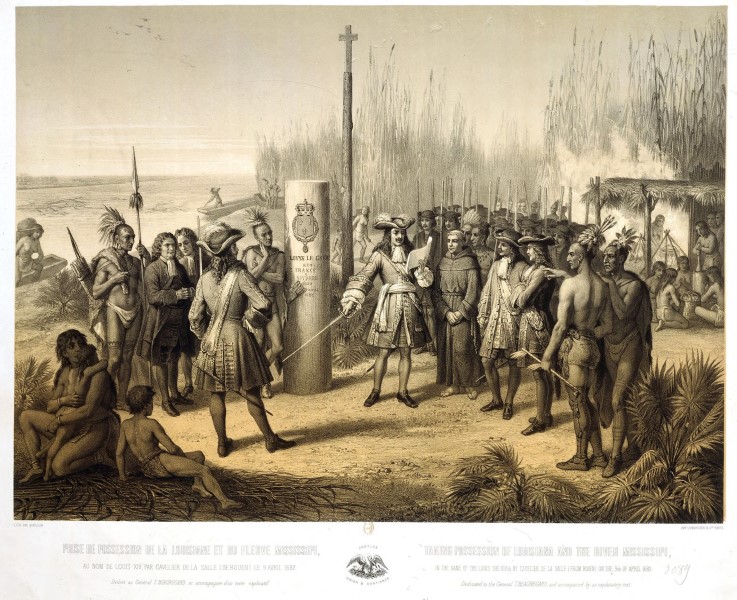April 9th, 1682, is traditionally remembered as the day when René-Robert Cavelier, Sieur de La Salle, after traveling southward from the Great Lakes had reached the end of the Mississippi River and claimed the entire watershed — nearly half of the present day United States — in the name of King Louis XIV of France, for whom Louisiana is named.
However, April 9th might not be the date of La Salle’s arrival at the mouth of the Mississippi and the founding of Louisiana colony. A manuscript long held at the Texas State Archives, opens a new window gives another date in its complete day-by-day account of the 1862 expedition as recorded by Nicolas de la Salle, notary of the expedition.
Nicolas describes the expedition’s journey all the way from Fort Frontenac in Ontario to the Gulf of Mexico. Along the way, they encountered several tribes of the Mississippi valley including the Acansa, Taensa, Natchez, and Coroa. The Frenchmen found the locals cultivating Old World fruit trees like apple, peach, pear, plum, and pomegranate. These crops apparently spread along trade routes from Mexico, where they had been introduced by the Spanish. The local tribes warmly received the French, and Nicolas' journal gives us some insight in their lifeways and customs. The expedition reached the river’s estuary on April 18th in Nicolas' account. Continuing through the wetlands, LaSalle made camp on an island at the end of the river on April 21st.
Nicolas' entry for April 22 reads thus:
We cut down a tree from which we made a post that we planted and there attached the King’s arms made from the copper of a kettle. We also erected a cross in the ground below it set a leaden plaque written upon it the words: “In the name of Louis XIV, king of France and Navarre, the 9th of April, 1682. We sang the Vexilla regis upon planting the cross, then the Te Deum and fired muskets three times. The provisions were failing, and we only had a handful of corn that day.
Why April 9th was claimed as the day the expedition reached its goal is unclear. Nevertheless, it is recognized as the day Louisiana was claimed for France.
René-Robert Cavelier La Salle continued exploring the Gulf region on behalf of France. However, he was killed in 1687 by discontented members of his own party while exploring what is now Texas. He is remembered as one of the founders of French Louisiana.
You can check out a translation of Nicolas de La Salle's journal, opens a new window and other books about the early exploration of Louisiana at St. Tammany Parish Library.
The La Salle Expedition on the Mississippi River
LaSalle and the Discovery of the Great West
A Comparative View of French Louisiana, 1699 and 1762
The History of Louisiana ; Translated From the French of M. Le Page Du Pratz




Add a comment to: La Salle and the Founding of French Louisiana